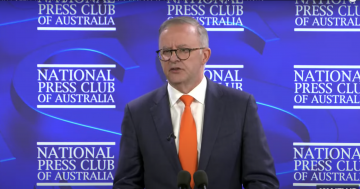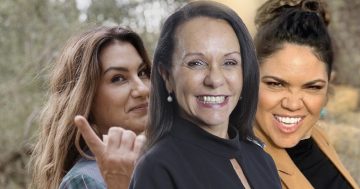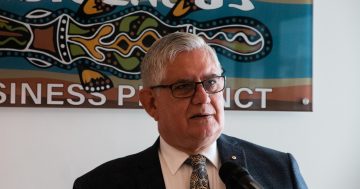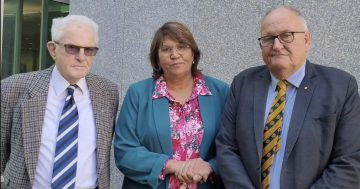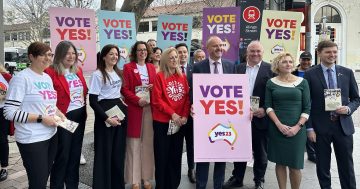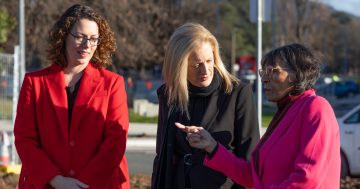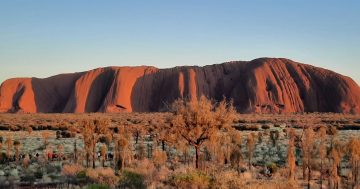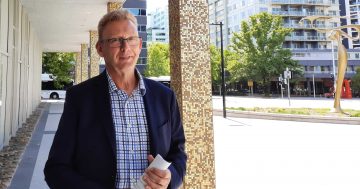
Cross-party support for the Voice is strong in Canberra. Photo: Travis Radford.
This Saturday’s Voice referendum would have probably passed without much controversy in an earlier, less febrile political environment.
But with an Opposition Leader desperate to chalk up a win against the Albanese Government and happy to let the right-wing misinformation machine do his dirty work on social media, what was ample majority support has been turned around, say the polls, during a campaign marred by lies, lies and more lies.
Apart from a few conservative jurists and those who have taken a stand on the principle that a body preferencing one sector of the community should not be enshrined in the Constitution, the public discourse has degenerated into a sewer of racist tropes about Australia’s First Nations, and distortions and misleading arguments designed to sow doubt, confusion and outright fear.
No matter how many times the No contentions are countered or the lies exposed, the zombie arguments keep being rolled out.
The general premise that if you don’t know vote No is a depressing reflection of an ailing political culture that threatens to stymie action on a range of significant issues confronting the nation, not just the Voice.
The likes of former High Court Chief Justice Robert French have effectively countered the legal arguments, reiterating the finding of the Solicitor-General that the Voice would enhance our democracy and that parliament or the executive would not be legally bound by the Voice’s advice.
The “ultimate form and functions [of the advisory body] will be in the hands of the elected parliament”, he says.
He also rejects the notion that a Yes result would introduce a race-based division in the Constitution.
“It would not matter whether Aboriginal and Torres Strait Islander peoples were one race or dozens of different races … The unifying characteristic which underpins the Voice is their history as our First Peoples,” he says.
Yet the claims continue about dividing the nation and the legal quagmire that will follow.
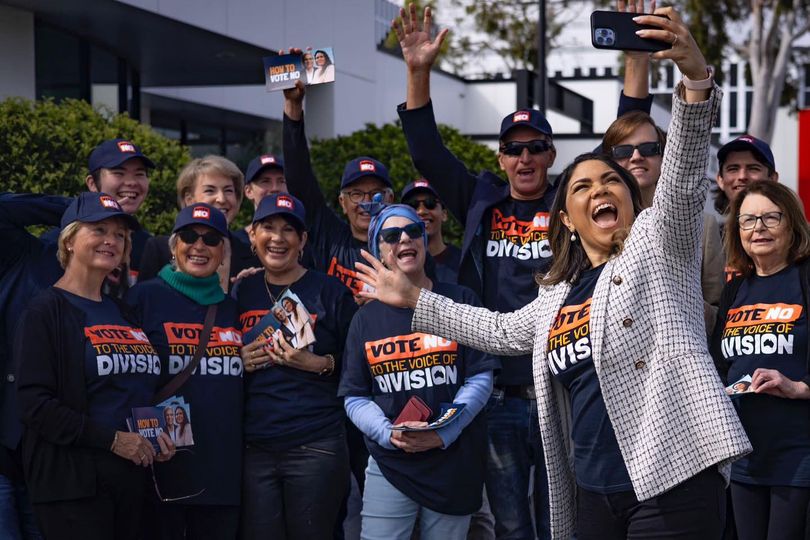
Big winner: Senator Jacinta Price on No campaign trail. Photo: Facebook.
Ironically, the campaign has also elevated an Indigenous Senator to national prominence as a No advocate.
It’s not clear who is using who, but Jacinta Price is now a darling of the right-wing media for her so-called truth-telling, willingness to move on and embrace of modernity.
Senator Price can say a lot that Peter Dutton can’t and her pitch is not to First Nations but the white electorate who will take comfort from the free pass she gives them when she insists colonialism brought nothing but good and has had no lasting impact on Indigenous people.
Hers is basically an assimilationist message that ignores the now well-documented frontier violence, dispossession, family destruction and institutional racism that First Nations, not just in Australia but around the world, are still dealing with.
Intergenerational trauma is real.
How would you feel if your home had been invaded, taken over and your parents killed, and then you are asked by the perpetrators to just get over it and move on because we’re all Aussies now?
Senator Price has also thrown into the mix the alleged waste of billions spent on programs for Indigenous people without evidence. This again feeds into white anxiety that the Voice will only exacerbate such waste on an undeserving people.
It’s an old argument that, as David Marr writes in his new book Killing for Country, echoes down through the decades from colonial times.
Never mind that the Voice intends to minimise waste and help target programs to what communities want and need.
Is Senator Price forgetting who has been in charge most of the past decade?
Throughout the referendum campaign, No advocates have not suggested any positive alternative to what the Voice offers.
This is a proposal to make a change for the better and make a practical and tangible impact on Indigenous wellbeing, something that has been lost in the unsightly politics.
If the polls are right on Saturday and Australians turn their backs on the proposal, where does that leave the country, and where does that leave First Nations?
A country more divided than ever and still unwilling to face the truth, make reparations and heal.
For First Nations, some will be resigned to yet another kick in the teeth, some will be heartbroken that they are still not made welcome in their own country and others may be embittered.
A Yes vote leads to open country. No takes us down into dark ravines and dead ends.
A No victory will also only confirm the effectiveness of the American-style, automated misinformation campaigns that have proliferated and become a template for defeating any number of measures that government needs to take, whether it be climate change, housing, tax or the environment, where entrenched interests have no concept of the public good or common wealth.
Such nihilism should not be rewarded.
But for all the polling forecasting defeat, there remains hope that the blizzard of negativity has been overblown and amplified and that come Saturday, voters will look at the ballot paper and opt for hope over fear and not miss this opportunity to really move on.












